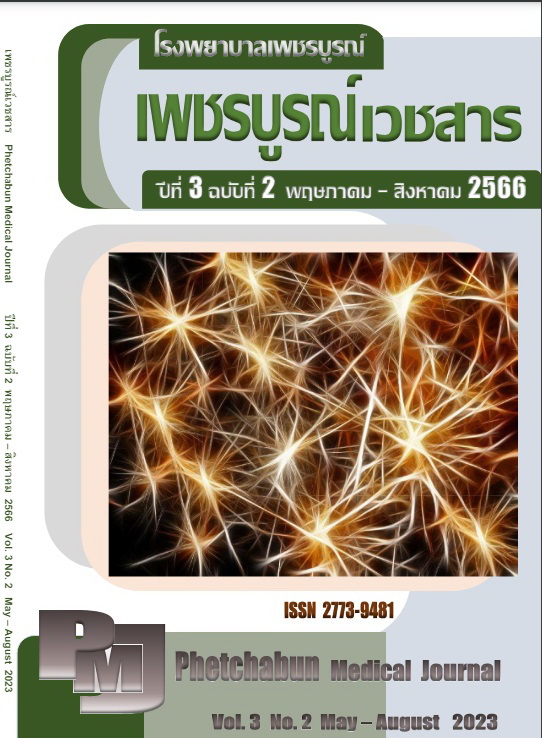Effect of the self-care ability development program on self-care behavior of school-age children with thalassemia in pediatric ward at Phetchabun hotpital
Keywords:
Self-care ability development program, self-care behavior, thalassemia, hemoglobinAbstract
The objective of this quasi-experimental research, two groups, pretest and posttest design was to study the effect of the self-care ability development program on the self-care behavior of school-age children with thalassemia. The sample consisted of 60 school-age children with thalassemia who were admitted to the pediatric ward at Phetchabun hospital. They were divided into 2 groups including 30 subjects of the experimental group received the self-care ability development program, and 30 subjects of the control group received regular instruction. The research tools consisted of self-care ability development program, self-care behavior assessment form and satisfaction assessment form. The research was conducted from December 2022 to April 2023. Data were analyzed using descriptive statistics including frequency, percentage, mean, and standard deviation, and inferential statistics
including chi-square test, independent t-test and paired t test.
The research found that school-age children with thalassemia who received the self-care ability development program had significantly higher mean self-care behavior score after the experiment than before the experiment (63.0, 46.0, p<0.001), and the mean hemoglobin increased significantly higher than before the experiment as well (13.0, 12.7 g/dl, p=0.030). Comparison the self-care behavior scores of school-aged children with thalassemia between the experimental group and the control group, It found that after the experiment, the experimental group that used the self-care ability development program had mean scores of self-care behavior (63.0, 52.4, p<0.001), and hemoglobin levels significantly higher than those in the control group (13.0, 12.7 g/dl, p=0.030). Moreover, satisfaction with the use of the self-care ability development program of children with thalassemia was at a high level, the mean score was 3.91. In summary, the use of self-care ability development program was effective in promoting good self-care behavior, and consequently increased the hemoglobin levels of children with thalassemia. Therefore, the self-care ability development program should be used continuously for children patients with thalassemia undergoing admission at hospital.

Downloads
Published
How to Cite
Issue
Section
License

This work is licensed under a Creative Commons Attribution-NonCommercial-NoDerivatives 4.0 International License.


